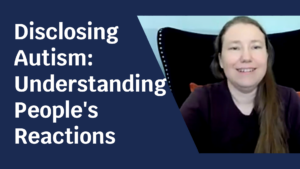
A conversation I ran across
I ran across a conversation on social media recently in the context of business marketing (I promise I have a point that’s relevant to you), and one of the participants (I’m not going to name who because I’m going to criticize their point) argued that it’s totally fine to promise clients you can get results for them in a particular timeframe, even when it’s up to the clients to do part of the work, and they may not do it according to your schedule. He said:
“We may know that clients rarely do everything as prescribed, but you can’t develop a system with that assumption. The estimated time is a product of a formula. You have to assume their effort/inputs will be A.) as prescribed and B.) constant — because a formula needs a constant or it’s not a formula.
If they are behind schedule, have an honest conversation about why & what needs to be done to fix it.”
Why am I bringing this up? It’s a perfect example of the type of thinking that leads a lot of Autistics to develop anxiety.
Why am I bringing this up? It’s a perfect example of the type of thinking that leads a lot of Autistics to develop anxiety.
Here’s what I mean.
Let’s replace “client” with “Autistic”, and loosen the focus from “getting results in a specific timeframe” to “getting results”.
“We may know that Autistics rarely do everything as prescribed, but you can’t develop a system with that assumption. The estimated results are a product of a formula. You have to assume their effort/inputs will be A.) as prescribed and B.) constant — because a formula needs a constant or it’s not a formula.
If they are behind the program, have an honest conversation about why & what needs to be done to fix it.”
How does this feel now? Is it more familiar?
This looks an awful lot like ABA, or Positive Behavioral Supports, and frankly, it looks an awful lot like the general attitude of society toward us in all the little moments of life.
I might rephrase it one more time to make that last connection more obvious:
“We may know that Autistics rarely do everything neurotypicals expect, but you can’t let them off the hook for that. You have to keep at them. You have to assume they will A.) keep trying to do things right, and B.) be consistent — because you need to be consistent or it won’t work.
If they mess up, talk to them about why & what needs to be done to fix it.”
How about now? Have you encountered this attitude?
The underlying assumption
The basic assumption underlying this is that 1) we know that these people are a certain way, but 2) we’re going to ignore reality, and 3) pretend that everyone is the way our concept says they should be, and deal with them on those terms, and when that predictably gets results we don’t want, 4) blame them and push them to become our conceptual people.
While most people wouldn’t recognize that as an intentional thought behind how they deal with the people around them, when you really get down to it, it’s essentially how a lot of us go through life.
“Ugh, he’s so rude. I’ve told him a thousand times he can’t say things like that. If he keeps it up, he’s going to lose his job.”
To be fair, some things are straight up mean and hurtful to say. But is he actually being mean? Or just autistically direct? Maybe other people could get curious about whether he’s telling the truth and consider his point, rather than just taking offense and trying to fix or punish him?
But is he actually being mean? Or just autistically direct?
I admit to doing this myself. Rather than taking people for who they are, I’ve been known to overly focus on what “should” be, and get frustrated that it’s not that way, rather than dealing with the real person or situation in front of me.
Over the last several years, as I’ve healed old wounds, unmasked, and learned healthier communication patterns, I’ve gotten a lot better at recognizing that impulse and not doing it.
What surprised me the most was that the more I disconnected from negative self-talk, and the less I judged myself, the less I judged others and the more my compassion for them grew. It happened quite naturally, and has been wonderful.
I mention this not to say how great I am, but to give hope that it is possible to change that pattern.
As someone who thinks and processes information and sensory data, and whose natural communication style lies, somewhat out of the expected range, I have been subjected to this pattern more than most.
How anxiety develops from this
Fortunately I never got ABA training, but I did get a lot of pressure to stop saying rude things, I got laughed at a lot, people would get offended when I didn’t mean it that way, or I would do something that I thought was humorous and it would go badly.
And, most of the time, the reactions of people around me were predictable and consistent. I was in the wrong. I needed to fix it.
They never explained how. Or what was so bad about whatever I said or did.
So my brain, that is excellent at problem-solving, would go to work on trying to figure out what the hell I did wrong.
But what was not consistent was the context, and the circumstances, and the manifold variety of factors, and exceptions, and, and, and… (how do some people just pick all this up intuitively???)
Sometimes I could figure out what my social faux pas was, but most of the time I was just left confused.
Over time, I learned enough of those rules to (more or less (kind of)) fit in, but there were lots of leaks around the edges. People could tell. I don’t think anyone was truly fooled. And damn, that was exhausting.
(Now I have a word for that: masking.)
But all that confusion had its effect; I was never sure what I would say or do that would set people off.
I never knew which way to turn. What to say. What not to say. What would make things worse.
The result was anxiety.
Fear. Without being able to point to a specific thing, and say, “It’s that.” “That thing is scary.”
‘That thing’ was “people.”
But that’s not really helpful. Because the same sentence with one person would lead to an eruption, but with another they would laugh and say “I love you so much.” (They were still laughing at what I said, but appreciated my unorthodox style?)
A lot of what I had to unlearn were the effects of people trying to fit me into their concepts of what “should” be.
After I figured out I’m autistic, that powerful problem-solving brain of mine went to work dismantling the results of other people trying to fit me into their “shoulds.” I started hacking all of those experiences in my past, finding the painful beliefs that I developed about myself and other people in society, figuring out how to be more myself and how to be okay with the fact that not everyone loves that.
It led to more authentic communication and better relationships.
A lot of what I had to unlearn were the effects of people trying to fit me into their concepts of what “should” be.
How to unlearn these things, and how to figure out what to unlearn, without gaslighting yourself, is precisely what I will be sharing in my anti-anxiety course.
Because we don’t have to live in the world of “shoulds” or chase their “normal.”
Are you ready to break out of their formula and feel better about yourself? To make your life better? (That’s scary, I know.) Well, this is how to deal with all the fears and anxieties that arise because of the years of (informal or formal) training in “being normal” you’ve received.
You were born on this Earth the way that you are, which means that you deserve to be on this Earth precisely the way you are.
Making that real isn’t easy (and that’s okay). And part of it is dealing with the fears and anxieties that come up every time you want to disclose something, or say no, or ask for accommodations, or tell someone what you really want, or ask for a change, or spend money on yourself, or try something new.
If you want to see this in action, here’s a post about a time when I actually told someone no, even though I was super anxious about it, but managed to get through it.
And I’ll include a link, just for those who are interested, to my anti-anxiety course in which I go over how do you actually get it to the point where you can say no, or ask for accommodations, or all the other minutia of life, from an autistic perspective, for autistics.
This is such an important thing for all of us, and I wish you well in your own Journey, and that you make today a neurowonderful day.




